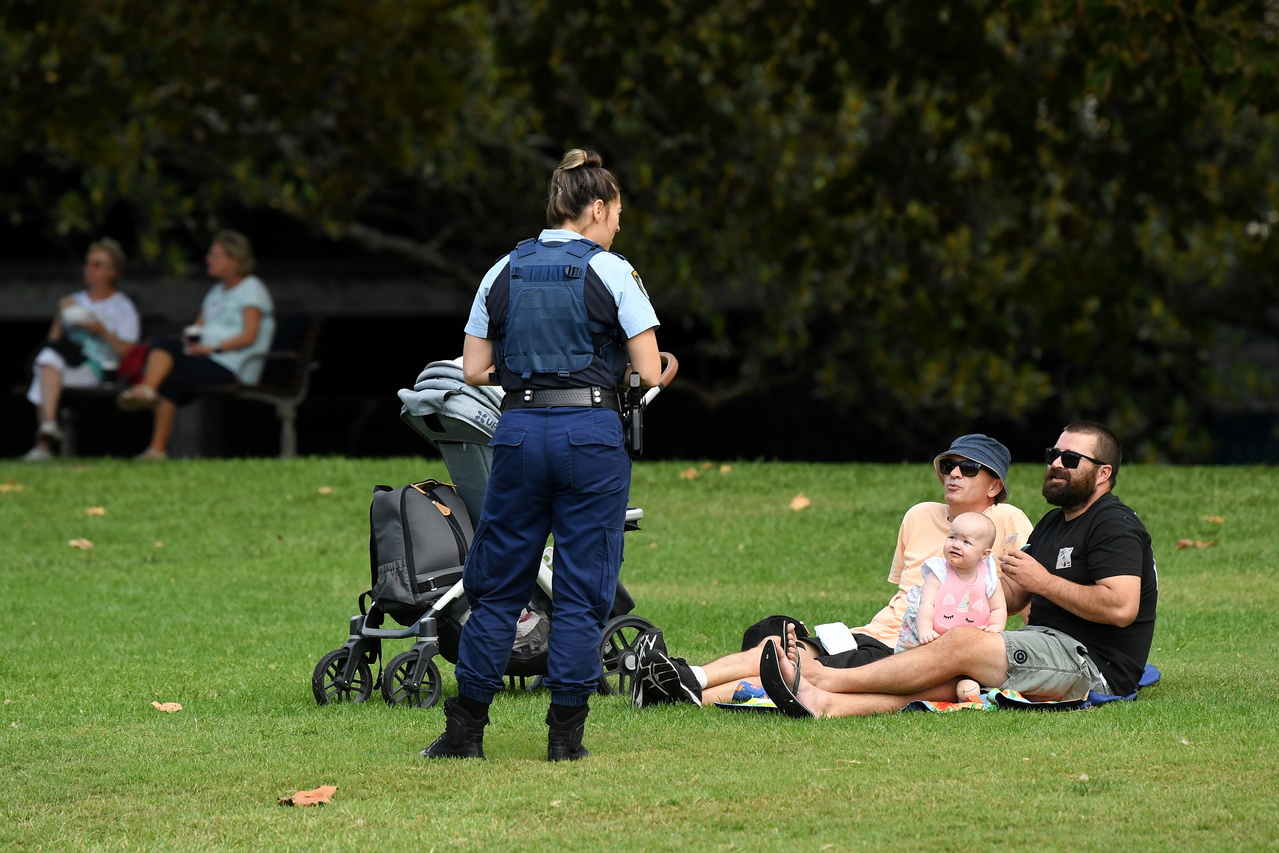Australian police put a 90-day limit on 'draconian' coronavirus measures
Sign up now: Get ST's newsletters delivered to your inbox

A police officer asks people to move on due to coronavirus restrictions in Australia on April 1, 2020.
PHOTO: EPA-EFE
Follow topic:
SYDNEY (REUTERS) - Australia authorities on Thursday (April 2) began putting time limits on the use of police to enforce restrictions on personal movement intended to slow the spread of the coronavirus, as standoffs continued with cruise ships denied entry to ports.
Australian states have instructed police to issue fines of up to A$11,000 (S$9,604) to people who violate federal orders that ban non-essential travel and limit groups of people gathering outside to two.
In New South Wales (NSW), home to nearly a third of Australia's 25 million population, police have also threatened prison terms of up to six months for people who violate the rules.
"When is the turn-off period for these orders? It is 90 days," state police commissioner Mick Fuller said in a televised news conference. "People will have gotten the message by then, hopefully. And we won't be talking about the powers, we'll be talking about what does it look like coming out of this?"
Police in NSW and other states have already started issuing tickets to people suspected of breaching orders that the authorities themselves have called "draconian".
Officials in the second most populous state of Victoria said policing of social distancing rules may last until June, without giving specific dates.
Like countries around the world, Australia has ordered the shutdown of restaurants, cafes, bars, movie theatres and instructed people to stay inside unless they are shopping for food or taking their daily exercise as it tries to contain the flu-like illness.
The restrictions have crippled the local economy, putting hundreds of thousands out of work and hammering investors.
Prime Minister Scott Morrison on Thursday said the country's childcare sector will get A$1.6 billion (S$1.4 billion) over the next three months from taxpayer subsidies in a package that would make childcare in the country free.
"We will be putting in place support arrangements to the childcare facilities, some 13,000 of them, to ensure they will be able to remain open and will be there for parents to ensure they can do what they need to do each day," Mr Morrison said in Canberra.
The childcare centre subsidy adds to a growing list of support packages worth some A$200 billion for airlines to mall owners as the government attempts to "hibernate" the Australian economy, to be reawakened when the crisis has passed.
The Australian share market was down about 3 per cent on Thursday, following declines on Wall Street where US health officials gave projections of hundreds of thousands of deaths, quashing hopes of a quick return to business as usual.
Australian health authorities have said infection rates appear to have slowed in recent days but it is too early to say definitively.
Australia has reported around 5,200 infections and 25 deaths, with daily increases in new cases dropping to single digits from between 25 per cent and 30 per cent two weeks ago.
"The curve is beginning to flatten," Health Minister Greg Hunt said. "It isn't sustained yet, it hasn't been consolidated, but those early, important signs are absolutely critical."
"The curve is beginning to flatten," Health Minister Greg Hunt said. "It isn't sustained yet, it hasn't been consolidated, but those early, important signs are absolutely critical."
Mr Morrison said on Thursday the country's testing rate was now more than 1,000 tests per 100,000 people, or 1 per cent of the population.
"We are the first country to the best of our knowledge that has been able to exceed that mark," Mr Morrison said.
"We are the first country to the best of our knowledge that has been able to exceed that mark," Mr Morrison said.
The country has meanwhile banned cruise ships from docking after being found to be the biggest single source of coronavirus infections, with 20 per cent of cases linked to passengers and crew from the ships.
Cruise ship arrivals became a source of public anger after hundreds of passengers from Carnival Corp's Ruby Princess were allowed to disembark in Sydney last month and hundreds later tested positive for Covid-19.
A military-style operation was planned to airlift doctors onto eight cruise ships floating off the NSW coast which were refusing orders to leave Australian waters, so that the doctors could conduct health checks on nearly 9,000 crew members, local media reported.
In Western Australia, a standoff continued between immigration officials and foreign-owned cruise ships which were also refusing to leave.
The Maritime Union of Australia said there were 11 foreign-owned cruise ships in limbo in Australian waters, with 11,000 crew members in total, and their situation was "an emerging humanitarian crisis".

